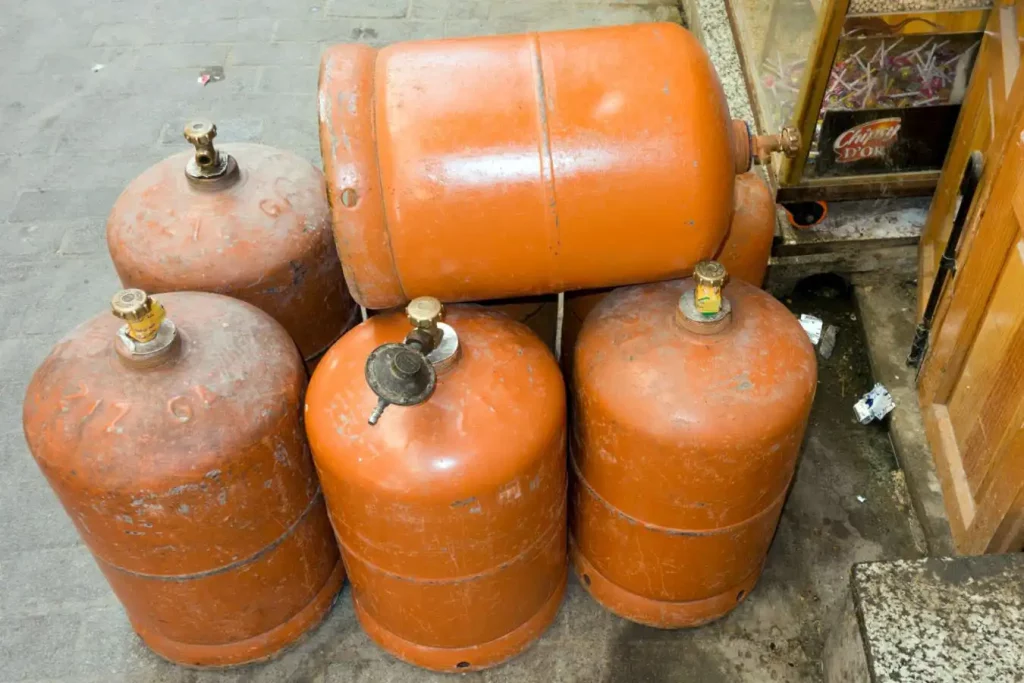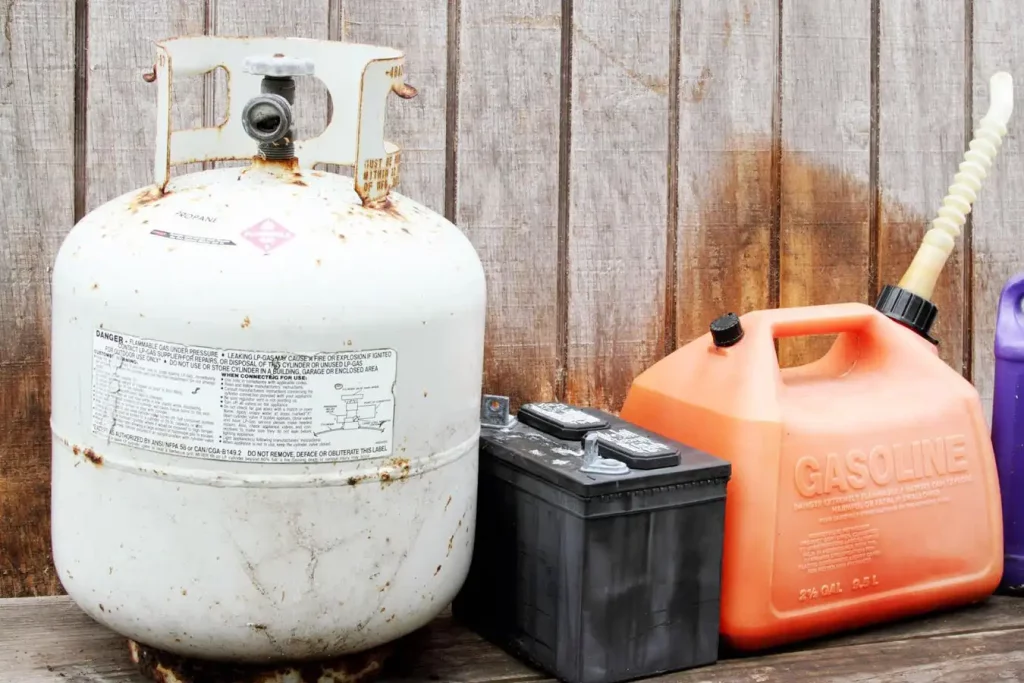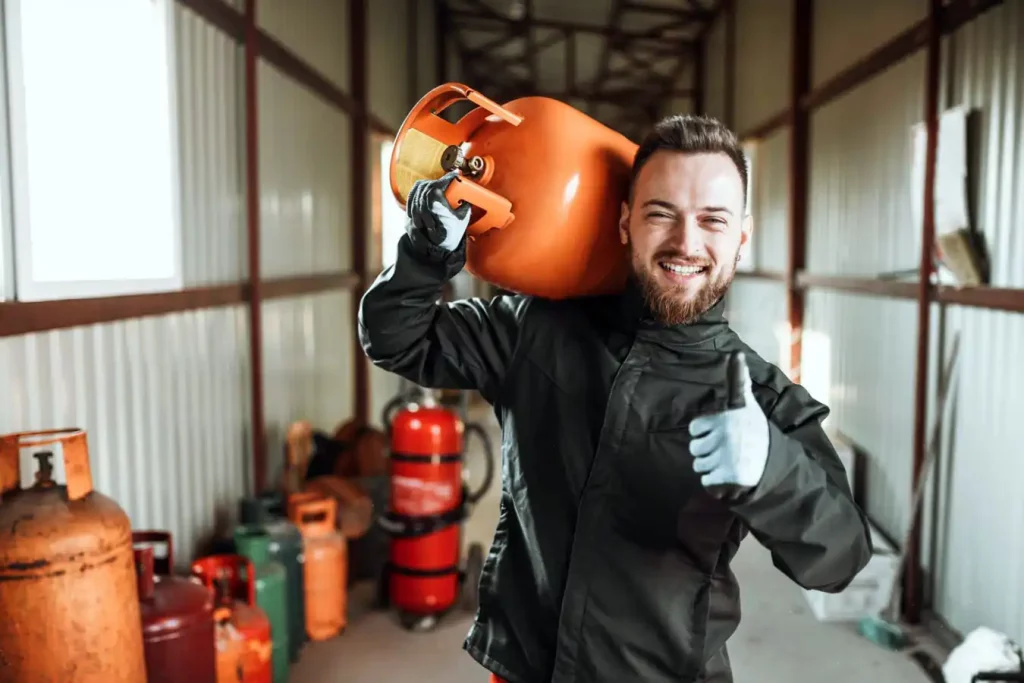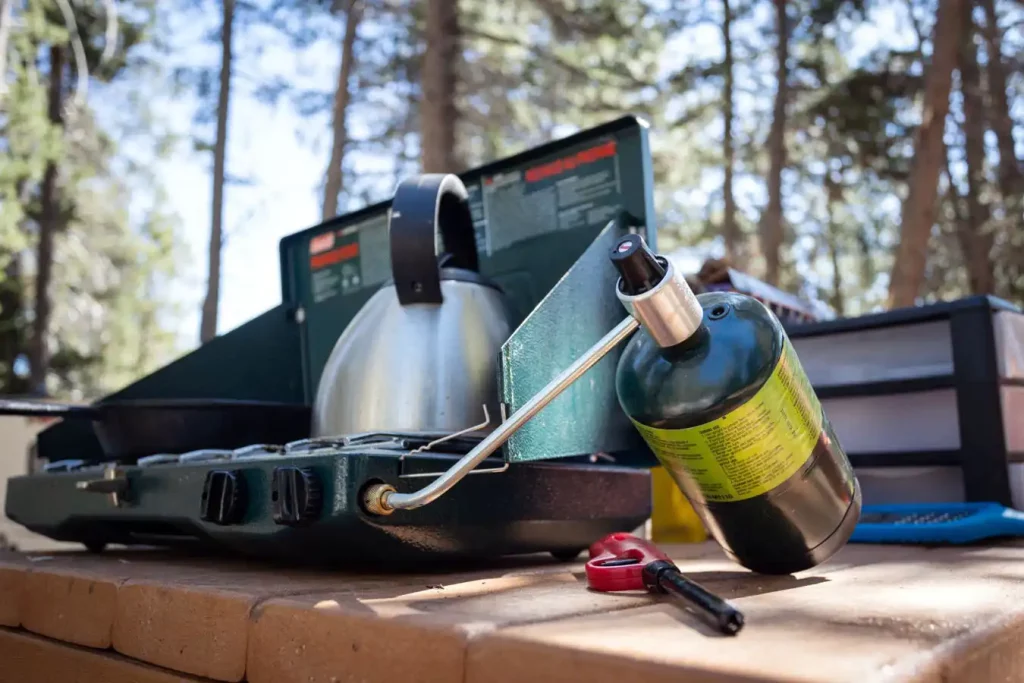How to dispose of camping propane tanks might not be the first thing you think of after a great camping trip.
But hey, we've all faced that moment: staring at an empty tank, wondering what on earth to do with it.
Toss it? Recycle it? Store it for a future DIY project?
I know, it's a bit of a head-scratcher.
Lucky for you, I'm here to lay it all out, step by step.
By the end, you'll be disposing of those tanks safely, responsibly, and with confidence.
Understanding Propane Tanks
What are Camping Propane Tanks?
Camping propane tanks are portable containers that store propane gas for various uses while camping. These tanks come in handy for heating, cooking, and even lighting up your camping area. They range from the smaller, one-pound cylinders often used for portable grills or lanterns, to larger 20-pound tanks that can fuel your RV's appliances. The size and type you need usually depends on the duration of your trip and the equipment you plan to use.

Why Can't Propane Tanks Be Disposed of Normally?
When you've squeezed the last bit of propane out of your tank, you can't just toss it in the trash like your empty snack wrappers. Propane tanks, even when empty, can contain residual gas that is both flammable and harmful to the environment. If punctured or exposed to high heat, they can explode, causing significant harm. On an environmental note, the residual propane, if leaked, contributes to greenhouse gas emissions. Plus, the metal from the tanks can take centuries to decompose in a landfill, contributing to environmental waste.
Why is it Important to Dispose of the Propane Tanks?
Proper disposal of camping propane tanks is crucial for several reasons. Firstly, it's a safety issue. Incorrect disposal can lead to accidental fires or even explosions. Imagine an unsuspecting sanitation worker compacting the trash, unaware of the propane tank lying within it. The outcome could be disastrous.
Secondly, it's an environmental concern. The improper disposal of propane tanks contributes to landfill waste and the release of harmful gases into the atmosphere. In contrast, recycling these tanks allows the metal to be reused, reducing environmental impact.
Lastly, it's a matter of responsibility. As campers, we should embody the mantra of “leave no trace,” maintaining the natural beauty of our outdoor spaces for future generations. The correct disposal of our propane tanks is part and parcel of this commitment. It's a small step, but one that makes a big difference!
Safety Measures When Handling Propane Tanks
Camping with propane calls for respect for this powerful source of energy. That means taking certain safety measures while using and handling propane tanks. Always store propane tanks upright and outdoors, not in enclosed spaces like tents, vehicles, or cabins. Also, keep them away from flames, sparks, or any heat source. When the propane tank is in use, ensure it's on a stable surface, away from foot traffic to avoid accidental toppling.
In the unfortunate event of a propane leak, the first thing you need to do is turn off the tank if it's safe to do so. If not, evacuate the area immediately and call the fire department. Remember, propane is highly flammable, and a single spark could ignite it.
How to Dispose of Camping Propane Tanks Safely
Ensuring the Propane Tank is Empty
Before disposing of a propane tank, you need to make sure it's completely empty. To do this, connect it to your camping stove or any propane-powered equipment and let it run until it stops. This can take some time, especially if the tank isn't close to being empty. If it's not feasible to burn off the remaining propane, some recycling centers or propane retailers have equipment to safely remove leftover propane. Just make sure to call ahead and ask!

Locating a Disposal or Recycling Center
Once you're sure your tank is empty, it's time to find a place to take it. Many local waste facilities and recycling centers accept empty propane tanks, but not all do. You can usually find this information on their websites, or you can give them a quick call to confirm. Additionally, some cities have special collection days for hazardous waste, including propane tanks.
Transporting the Propane Tanks Safely
Transporting propane tanks, even when empty, requires some precautions. They should always be kept upright and secured so they won't roll or slide around. It's also a good idea to keep your car windows open for ventilation. If you notice a smell of gas during transport, stop your vehicle in a safe location, evacuate, and call the fire department.
In short, to dispose of camping propane tanks, ensure they're empty, then take them to a local waste facility, recycling center, or propane dealer that accepts them, or use a retailer's tank exchange program.
Where to Dispose of Your Camping Propane Tank
Your local waste facility is a good start when looking to dispose of your propane tank. Remember to call ahead to ensure they accept them, and ask about any preparation needed before dropping them off.
Another option is retailer propane tank exchange programs. Retailers such as Home Depot or Lowe's often offer programs where you can trade in your empty tank for a full one. Not only does this eliminate the need to dispose of the tank yourself, but it also ensures that the tanks are reused, which is a win for the environment!

Finally, propane dealers are another avenue to consider. Many dealers will accept old tanks, regardless of whether you're buying a new one.
Disposing of camping propane tanks might seem like a daunting task, but with the right knowledge and some patience, it can be done safely and efficiently. By doing so, you're doing your part to keep both people and the environment safe.
Learn more: How to Dispose of Dishwater When Camping
Alternatives to Disposal
While safe disposal is crucial, there are ways to prolong the life of your camping propane tanks and delay their trip to the recycling center.
Refilling Propane Tanks
Many propane tanks, especially the larger ones, can be refilled instead of being disposed of once empty. This can be done at many propane dealers or at specialized refilling stations often found at gas stations or camping supply stores. Before refilling, ensure your tank is in good condition without any visible rust, dents, or other damage. The refill process is usually quick and straightforward, and the refilled tank can be reused immediately.
Exchanging Propane Tanks
Aside from refilling, many retailers and propane dealers offer propane tank exchange programs. With these programs, you bring your empty tank and swap it for a full one. It's a convenient option if you're on the go or if you don't have a refill station nearby. Just remember to check the condition of the tank you're receiving in exchange, ensuring it's up to safety standards.
What to Do If You Can't Find a Disposal Option Near You
Contacting Local Waste Management Authorities
If you're having difficulty finding a place to dispose of your camping propane tank, your local waste management authorities are a good first point of contact. They often have information about hazardous waste disposal, including propane tanks, and can point you in the right direction.
Seeking Advice from Camping or Outdoor Equipment Stores
Another option is to reach out to local camping or outdoor equipment stores. They're usually well-versed in the needs of campers, including the disposal of camping propane tanks, and might be able to suggest local options you hadn't considered.
FAQs about to Dispose of Camping Propane Tanks
How do you dispose of old camping gas canisters?
How do I dispose of a 1lb propane tank near me?
How do you empty a Coleman propane tank?
How do I know if my camping propane tank is empty?
Do camping propane tanks go bad?
Does camping propane go bad?
Conclusion
Whether you're a seasoned camper or a novice just getting into the great outdoors, understanding how to dispose of camping propane tanks is crucial. Improper disposal can lead to environmental damage and even pose a safety risk, so it's something we need to take seriously.
There are several ways to safely dispose of these tanks, from local waste facilities to retailer exchange programs and propane dealers. If you're having trouble finding a disposal option, reach out to your local waste management authorities or a nearby camping supply store.
And remember, there are alternatives to disposal, too. Refilling or exchanging your tank can extend its life and reduce waste.
Camping brings us closer to nature. Let's do our part in keeping it clean and safe by disposing of or recycling our camping propane tanks responsibly. Happy camping!
Remember, the adventure is in the journey, not just the destination. Do your part to ensure a smooth journey for all by taking care of our shared environment.
Read next: What to Put Under Air Mattress When Camping


